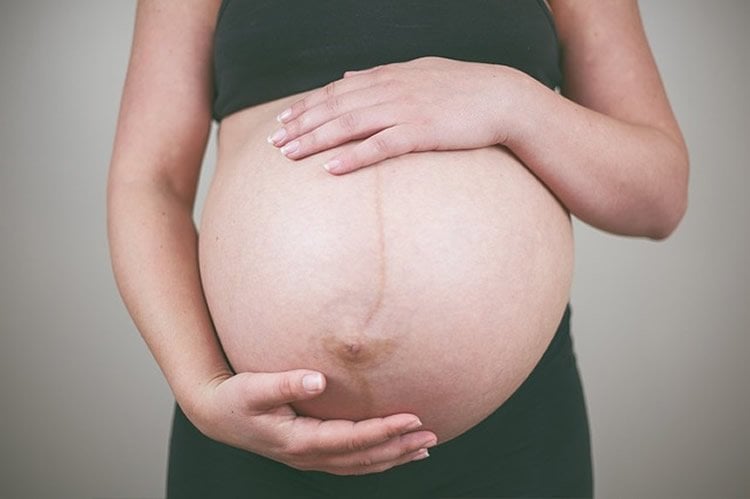Summary: Study reveals a link between low levels of a thyroid hormone during pregnancy and schizophrenia in the offspring.
Source: Elsevier.
A study published in Biological Psychiatry reveals a new link between low levels of the thyroid hormone thyroxine during pregnancy and risk of schizophrenia in the offspring.
Low levels of free thyroxine in pregnant women, referred to as hypothyroxinemia, are associated with abnormalities in cognitive development similar to those in schizophrenia, a neurodevelopmental disorder. Hypothyroxinemia is also associated with preterm birth, a risk factor for schizophrenia.
To determine if hypothyroxinemia is associated with schizophrenia, the study, led by senior author Dr. Alan Brown, Professor of Psychiatry Epidemiology at Columbia University Medical Center, the New York State Psychiatric Institute, and Columbia University’s Mailman School of Public Health, examined thyroxine levels in archived serum samples from 1010 mothers of children with schizophrenia and 1010 matched control mothers. The sera were collected during the first and early second trimesters of pregnancy as part of the Finnish Maternity Cohort. Comprehensive Finnish registries of the population and psychiatric diagnoses provided information on case status (schizophrenia or control) among offspring of mothers corresponding to the prenatal serum samples.
The authors found that 11.8% of people with schizophrenia had a mother with hypothyroxinemia, compared with 8.6% of people without schizophrenia. The finding was statistically significant. This suggests that children of mothers with hypothyroxinemia during pregnancy have increased odds of developing schizophrenia. The association remained even after adjusting for variables strongly related to schizophrenia such as maternal psychiatric history and smoking.
First author of the study Dr. David Gyllenberg of the University of Turku, Finland, thinks the importance of this paper is that it “links the finding to an extensive literature on maternal hypothyroxinemia during gestation altering offspring brain development.” Dr. Gyllenberg was a visiting scholar at Columbia University when much of the research was conducted.
Brown emphasized that “this work adds to a body of literature suggesting that maternal influences, both environmental and genetic, contribute to the risk of schizophrenia. Although replication in independent studies is required before firm conclusions can be drawn, the study was based on a national birth cohort with a large sample size, increasing the plausibility of the findings.”
This study did not address the cause of this association, but did find that adjusting for preterm birth lessened the association between hypothyroxinemia and schizophrenia, suggesting that preterm birth may mediate some of the increased risk.

The authors note in the paper that the finding may not be specific to schizophrenia, and should be studied as a risk factor for other neurodevelopmental disorders as well, such as bipolar disorder and autism. The finding is expected to stimulate further studies examining how hypothyroxinemia causes neurodevelopmental abnormalities and ultimately contributes to risk of mental illnesses that arise during development.
“As rodent models of maternal hypothyroxinemia have been developed and schizophrenia is largely considered a disorder of brain development, I hope this paper can inform future animal studies examining molecular and cellular deviations that are relevant to schizophrenia,” said Gyllenberg.
Dr. John Krystal, Editor of Biological Psychiatry, thinks the association has clinical potential for reducing risk in the offspring of mothers with low thyroxine levels. “This study identifies a preventable potential contributor to the risk for schizophrenia. Maternal hypothyroidism can be easily diagnosed and effectively treated,” said Krystal.
The authors’ affiliations, and disclosures of financial and conflicts of interests are available in the article.
Source: Rhiannon Bugno – Elsevier
Image Source: This NeuroscienceNews.com image is in the public domain.
Original Research: Abstract for “Hypothyroxinemia During Gestation and Offspring Schizophrenia in a National Birth Cohort” by David Gyllenberg, Andre Sourander, Heljä-Marja Surcel, Susanna Hinkka-Yli-Salomäki, Ian W. McKeague, and Alan S. Brown in Biological Psychiatry. Published online June 18 2016 doi:10.1016/j.biopsych.2015.06.014
[cbtabs][cbtab title=”MLA”]Elsevier. “Increased Schizophrenia Risk in Offspring of Mothers With Low Thyroxine Levels During Pregnancy.” NeuroscienceNews. NeuroscienceNews, 21 June 2016.
<https://neurosciencenews.com/schizophrenia-thyroxine-pregnancy-4534/>.[/cbtab][cbtab title=”Elsevier”]Elsevier. (2016, June 21). Increased Schizophrenia Risk in Offspring of Mothers With Low Thyroxine Levels During Pregnancy. NeuroscienceNews. Retrieved June 21, 2016 from https://neurosciencenews.com/schizophrenia-thyroxine-pregnancy-4534/[/cbtab][cbtab title=”Chicago”]Elsevier. “Increased Schizophrenia Risk in Offspring of Mothers With Low Thyroxine Levels During Pregnancy.” https://neurosciencenews.com/schizophrenia-thyroxine-pregnancy-4534/ (accessed June 21, 2016).[/cbtab][/cbtabs]
Abstract
Hypothyroxinemia During Gestation and Offspring Schizophrenia in a National Birth Cohort
Background
Evidence from animal and human studies indicates that thyroid hormone deficiency during early gestation alters brain development. As schizophrenia is associated with prenatal brain insults and premorbid cognitive deficits, we tested the a priori hypothesis that serologically defined maternal thyroid deficiency during early gestation to mid-gestation is associated with schizophrenia in offspring.
Methods
The investigation is based on the Finnish Prenatal Study of Schizophrenia, a nested case-control study that included archived maternal sera from virtually all pregnancies since 1983 (N = >1 million). We identified all offspring in the cohort with a diagnosis of schizophrenia based on the national inpatient and outpatient register and matched them on sex, date of birth, and residence in Finland at time of onset of the case to comparison subjects (1:1) from the cohort. Maternal sera of 1010 case-control pairs were assessed for free thyroxine, and sera of 948 case-control pairs were assessed for thyroid-stimulating hormone.
Results
Maternal hypothyroxinemia (free thyroxine ≤10th percentile, normal thyroid-stimulating hormone) was associated with an increased odds of schizophrenia (odds ratio = 1.75, 95% confidence interval = 1.22–2.50, p = .002). When adjusted for maternal psychiatric history, province of birth, and maternal smoking during pregnancy, the association remained significant (odds ratio = 1.70, 95% confidence interval = 1.13–2.55, p = .010).
Conclusions
In a large, national birth cohort, prospectively documented hypothyroxinemia during early gestation to mid-gestation was associated with increased odds of schizophrenia in offspring. This information can inform translational studies of maternal hypothyroxinemia examining molecular and cellular deviations relevant to schizophrenia.
“Hypothyroxinemia During Gestation and Offspring Schizophrenia in a National Birth Cohort” by David Gyllenberg, Andre Sourander, Heljä-Marja Surcel, Susanna Hinkka-Yli-Salomäki, Ian W. McKeague, and Alan S. Brown in Biological Psychiatry. Published online June 18 2016 doi:10.1016/j.biopsych.2015.06.014






